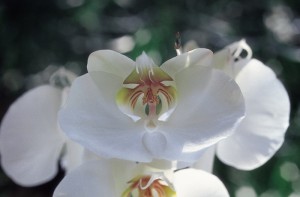How to Grow Orchids
 Orchids grow in all types of conditions from those of the rain forest to the arctic circle. With such an ability to adapt to diversity and just about every possible environment, it would seem that they would have no problem being cultivated in homes and gardens.
Orchids grow in all types of conditions from those of the rain forest to the arctic circle. With such an ability to adapt to diversity and just about every possible environment, it would seem that they would have no problem being cultivated in homes and gardens.
With selection from the 30,000 species of orchids now identified and hybrids, which number in the 200,000 to 300,000 range, it should be easy to choose the perfect orchid to grow in your particular location.
Still, orchids have the reputation of being hard to grow. Many of them are indeed difficult but there are so many thousands of orchids, it is usually pretty easy to find one that will successfully grow inside or outside wherever you are located.
If you are a beginner, the best choice for growing your first orchid is going to be to start out by purchasing a mature plant.
It is almost impossible to grow orchids from seeds. They need sterile conditions and the presence of a special fungus, without which an orchid can never germinate. This is one of the reasons orchids themselves send out thousands of seeds and only one or two of them will ever germinate.
It is possible to propagate by division and this is an easier method. Just remember that it could take up to eight years before a plant started in this manner flowers.
Orchids don’t follow many general rules but this one applies to most orchids: Place your orchids, whether inside or outside, in a spot where they will get lots of light.
Because light hours are so limited in the winter in colder climates, you will most likely want to install artificial lights to help them grow. While there is some disagreement whether to use grow lights or other types, the choice will depend on the species of orchid you intend to grow. Check at purchase to see if it needs very high intensity lights or not.
Orchids are not one of those plants you can never water and ignore for months at a time.
While they definitely don’t like to be over-watered, orchids do like a once-per-week watering. They should dry out between one watering and the next, but they should never be completely dry.
Also, be careful about watering an orchid that was just replanted or has been disturbed in some way.
Orchids are also not terribly fond of the dry air created in the winter by most of today’s furnaces. You will most likely need to get a humidifier.
Most orchids love hot, humid weather and are not unhappy even with 70% to 80% humidity.
Orchids are fertilizer-lovers. They should be kept fertilized throughout the growing season and especially when they are flowering as most flower for an extended period of time.
There is always controversy among gardeners about what fertilizer is best. Overall, liquid fertilizer is preferred. But you can go completely organic, such as with fish emulsions or fertilizer from worm castings.
Or, you can use synthetic fertilizers such as 10-10-10, 30-10-10 or 10-10-30. Specific orchid fertilizers are also available.
As for the growing medium itself, everyone has their own favorite formula. It also depends on the type of orchid you are growing.
You can use fir bark, coconut fiber, sphagnum moss, peat moss, roots of dried fern, cork, or lava rock, to name several. A few orchids, such as cymbidiums and paphiopedilums, are considered terrestrials and can grow in soil.
The easiest orchids for beginners are Cattleyas, Epidendrumns, Oncidiums, and Laelias.
Whatever type of orchid you plant, be patient. Your efforts will be rewarded in time with beautiful flowers which are long-lasting.
Comments are closed.


My orchid has a baby growing on the stem. It has leaves and roots sprouting. Where do I cut the stem and do I just put it in soil and just treat it like the mother?
I have a baby cattleyas which was thriving but all of a sudden the leaves are dropping off . It looks like I have killed it. I was advised to water it when it was very dry (I had been watering every 10 days.) To water it, I was placing it in a cup so the water would be touching the rim.
Can you help me? I am really a novice .
Lubov
Lillian. It sounds like a classic case of over watering. fFrst off once a week or every two weeks is plemty. If you are not sure when to water check the roots. Are the roots spongy to the touch? if so this is normal and require no water. I the roots are mushy the orchid is being over watered. If they are very dry to the touch,it’s time to water. hope this helps.